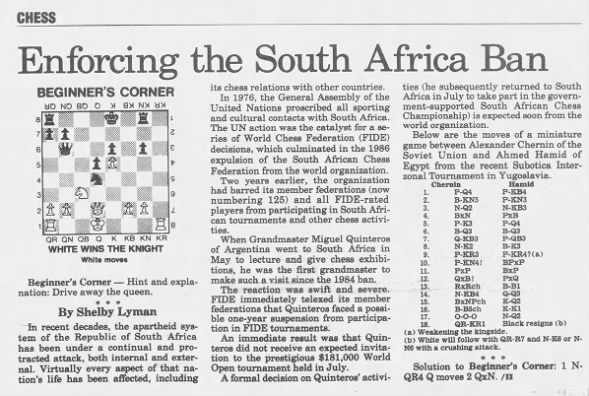< Prev Index Next >
 Chess 16 Aug 1987, Sun Newsday (Suffolk Edition) (Melville, New York) Newspapers.com
Chess 16 Aug 1987, Sun Newsday (Suffolk Edition) (Melville, New York) Newspapers.com
Chess by Shelby Lyman
Enforcing the South African Ban
In recent decades, the apartheid system of the Republic of South Africa has been under a continual and protracted attack, both internal and external. Virtually every aspect of that nation's life has been affected, including its chess relations with other countries.
In 1976, the General Assembly of the United Nations proscribed all sporting and cultural contacts with South Africa. The UN action was the catalyst for a series of World Chess Federation (FIDE) decisions, which culminated in the 1986 expulsion of the South African Chess Federation from the world organization.
Two years earlier, the organization had barred its member federations (now numbering 125) and all FIDE-rated players from participating in South African tournaments and other chess activities.
When Grandmaster Miguel Quinteros of Argentina went to South Africa in May to lecture and given chess exhibitions, he was the first grandmaster to make such a visit since the 1984 ban.
The reaction was swift and severe. FIDE immediately telexed its member federations that Quinteros faced a possible one-year suspension from participation in FIDE tournaments.
An immediate result was that Quinteros did not receive an expected invitation to the prestigious $181,000 World Open tournament held in July.
A formal decision on Quinteros' activities (he subsequently returned to South Africa in July to take part in the government-supported South African Chess Championship) is expected soon from the world organization.
Below are the moves of a miniature game between Alexander Chernin of the Soviet Union and Ahmed Hamid of Egypt from the recent Subotica Interzonal Tournament in Yugoslavia.
Alexander Chernin vs Ahmed Ibrahim Hamed
Subotica Interzonal (1987), Subotica YUG, rd 9, Jul-??
Dutch Defense: Hopton Attack (A80) 1-0






















